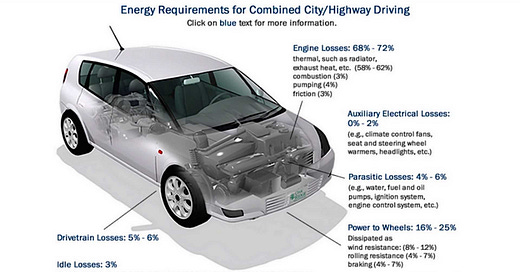The latest report from the Intergovernmental Panel on Climate Change (IPCC) was released last Monday. It is all about how to cut carbon emissions to prevent disastrous and costly levels of climate change. Here’s the IPCC’s three main need-to-knows:
Need-to-Know 1: Countries know how to cut emissions but simply aren’t doing it.
Need-to-Know 2: We’re out of time. Global fossil fuel use must peak in next year or two.
Need-to-Know 3: We can all live well on half the amount of energy we currently use.
You probably haven’t heard much about #3. Nor heard about the fact that more than 60% of the energy produced is wasted. Yes, 62.3% of the energy generated in 2020 in the US was wasted according to Lawrence Livermore National Laboratory. Most that waste came fossil fuel energy sources.
Need-to-Know 4: At least 60% of energy produced is wasted
The entire US transportation system consumed 24.3 quads of energy. (A quad is a way to measure massive amounts of energy. It’s equivalent to the energy of 183 million barrels of petroleum or 38.5 million tons of coal.) Virtually all energy used in transportation is from fossil fuels, with 90% coming from gasoline or diesel. How much of the energy used in transportation is wasted? Nearly 80%.
Here’s an example of how energy is wasted:
Your car burns gasoline and that produces large amounts of waste heat. Only 15% to 25% of the energy from combustion ends up being used to move the vehicle. Spend $100 on gas and you only get $20 worth of energy service on average. And this is after 100+ years of improving combustion engine technology.
An electric vehicle (EV) simply transfers the electricity in the battery to the electric motor and 90% of the energy is used to move the vehicle. This makes an EV 4 to 5 times more energy efficient.
So, despite the enormous environmental and human health costs of ripping fossil fuels out of the ground, and polluting our water and air with their toxic byproducts, not mention wrecking our climate, fossil fuels still account for more than 80% of global energy production.
Surely we can do better. It’s shocking we haven’t done better.
One the big reasons we haven’t done better is that our political and economic systems are based on consumption, and really, over consumption. Our “more-more-more” way of tackling most problems is wasteful and ineffective. We’ve seen lots of hype from the oil and gas industry and their political friends claiming the solution to inflation (and any other problem including climate change!!) is “more-more-more” oil and gas production.
No one really wants more oil or gas or even energy. We want the services energy provides: light, heat, transport and so on. When you look at the best, more efficient ways to get those energy services, it turns out far less energy needs to be generated in the first place.
Need-to-Know 5: No one needs more energy, just better energy services.
About half the energy currently being produced would be enough to provide everyone with the energy needed for decent living conditions, according to the IPCC report’s Chapter 5. This includes the 2 billion people who currently lack decent energy services.
What exactly is decent living? From a recent study that took a bottom-up look at energy services needed for decent living:
Homes with highly-efficient facilities for cooking, storing food and washing clothes; low-energy lighting throughout; with an indoor temperature of around 20 °C throughout the year.
Homes with computer with access to global ICT networks and are linked to extensive transport networks providing ~5000–15,000 km of mobility per person each year via various modes;
Homes near facilities where universal healthcare is available and others that provide education for everyone between 5 and 19 years old.
And at the same time, it is possible that the amount of people’s lives that must be spent working would be substantially reduced.
That looks like a pretty nice way of living to me.
Need-to-Know 6: Everyone could have decent living conditions using half the amount of today’s energy consumption.
Impossible? Consider that IPCC reports are peer-reviewed and subject to intense scrutiny by the world’s experts. On top of that, representatives from every country also approve those reports. That’s why the conclusions are often in technical or vague so as not to panic those with vested interests in the status quo.
Having to produce far less energy would make it easier, faster and cheaper to power the world on 100% renewable energy with existing technologies. The IPCC makes it clear the real obstacles to this future are the enormous economic and socio-political changes needed to bring it about.
What can you and I do? To quote the report:
We can become “role models of low-carbon lifestyles, by investing into low-carbon business, and by lobbying for stringent climate policies.”
Need-to-Know 7: We can be role models of decent, low-carbon living.
Until next week, be well.
Stephen
P.S. We often forget how costly our fossil fuel use truly is.







"No one needs more energy, just better energy services" - this is so important. Walt Patterson's 'Keeping the Lights On' (2007) also challenges traditional assumptions about how we think of energy and electricity. And thanks for info on the efficiency of EVs - and the current energy wastage.